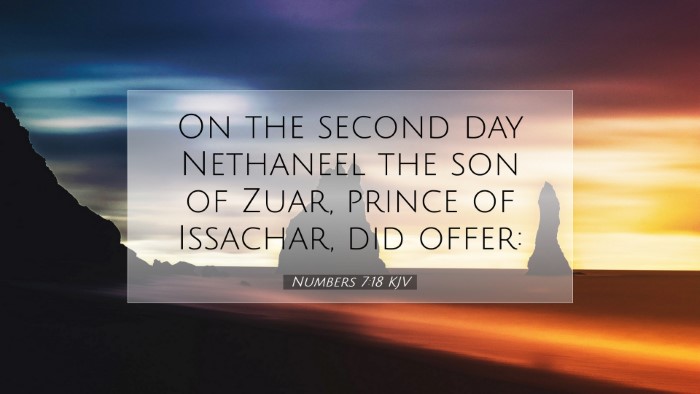Commentary on Numbers 7:18
Verse Text: Numbers 7:18 - "On the second day Nethanel the son of Zuar, prince of Issachar, did offer."
Introduction
This verse is part of a larger section in which the leaders of the tribes of Israel bring offerings for the dedication of the altar. Specifically, it highlights the contributions of Nethanel, a leader of the tribe of Issachar. The context of this passage emphasizes God's order and the significant role of leaders within the community.
Overview of Commentaries
Commentaries from respected theologians such as Matthew Henry, Adam Clarke, and Albert Barnes offer rich insights into this verse, illuminating its theological and practical implications for pastors, students, and scholars.
Matthew Henry's Commentary Insights
Leadership and Responsibility: Henry emphasizes that the leaders of Israel had a significant role in the spiritual life of the community. Nethanel’s offering on behalf of Issachar demonstrates not only his personal devotion but also the responsibility of leaders to engage in acts of service that reflect God’s grace.
God’s Appreciation of Order: Additionally, Henry notes that the organization in which these offerings were made underscores God’s desire for order among His people. Each tribe, represented by its leader, brings offerings systematically, which serves as a model for church order and the importance of representation in collective worship.
Albert Barnes' Commentary Insights
Significance of Offerings: Barnes points out the importance of sacrificial offerings within the Hebrew tradition, showing how they reflect a commitment to God and an acknowledgment of His sovereignty. The act of offering by Nethanel signifies the covenant community’s collective gratitude and dependence on God’s providence.
Symbolism of the Tribe of Issachar: He elaborates on Issachar's role within Israel, providing context to Nethanel's leadership. The tribe of Issachar was known for its knowledge of the times and its ability to provide guidance (1 Chronicles 12:32). This understanding enhances the meaning of Nethanel's offering as an expression of trust in God’s guidance and providence.
Adam Clarke's Commentary Insights
Covenantal Context: Clarke emphasizes the broader covenant context in which this event occurs. The offerings are not merely rituals, but they signify a deep-rooted covenant between God and Israel. Nethanel’s offering is positioned as more than a personal act; it is a representation of the entire tribe's commitment to uphold God’s commands.
Spiritual Significance: Clarke also reflects on the spiritual implications of such offerings, suggesting that they symbolize the worshiper’s heart. The act of giving is intertwined with an attitude of thankfulness and acknowledgment of God's enduring mercy. He urges readers to consider how contemporary offerings in Christian practice reflect similar attitudes of worship.
Theological Themes
- Leadership in Worship: The verse serves as a reminder of the importance of leadership in the communal worship of God. Leaders are to set an example in their dedication and offerings.
- The Nature of Offerings: This passage sheds light on the principle of offerings in the community of faith. It transcends mere ritualism, pointing to the heart's condition before God.
- Covenantal Relationships: The repeated emphasis on offerings connects to the themes of covenant blessings and responsibilities that permeate the narrative of Israel.
Practical Applications
- Encouragement for Leaders: Pastors and church leaders should take to heart the example of Nethanel—a call to lead with integrity and to engage actively in acts of worship and service.
- Understanding Offerings Today: Congregations should reflect on what it means to make offerings in their lives today, moving beyond monetary contributions to include acts of service, prayer, and dedication to God’s mission.
- Community and Collective Responsibility: The participation of all tribes points to the collective responsibility within the body of Christ. Every member has a role to play in the spiritual health of the community.
Conclusion
Numbers 7:18 not only records a historical event but also serves as a rich source of theological reflection on leadership, community, and the nature of worship. The insights drawn from public domain commentaries reveal the depth and significance of this verse in the context of Israel's covenant relationship with God and provide valuable lessons for today's church.


